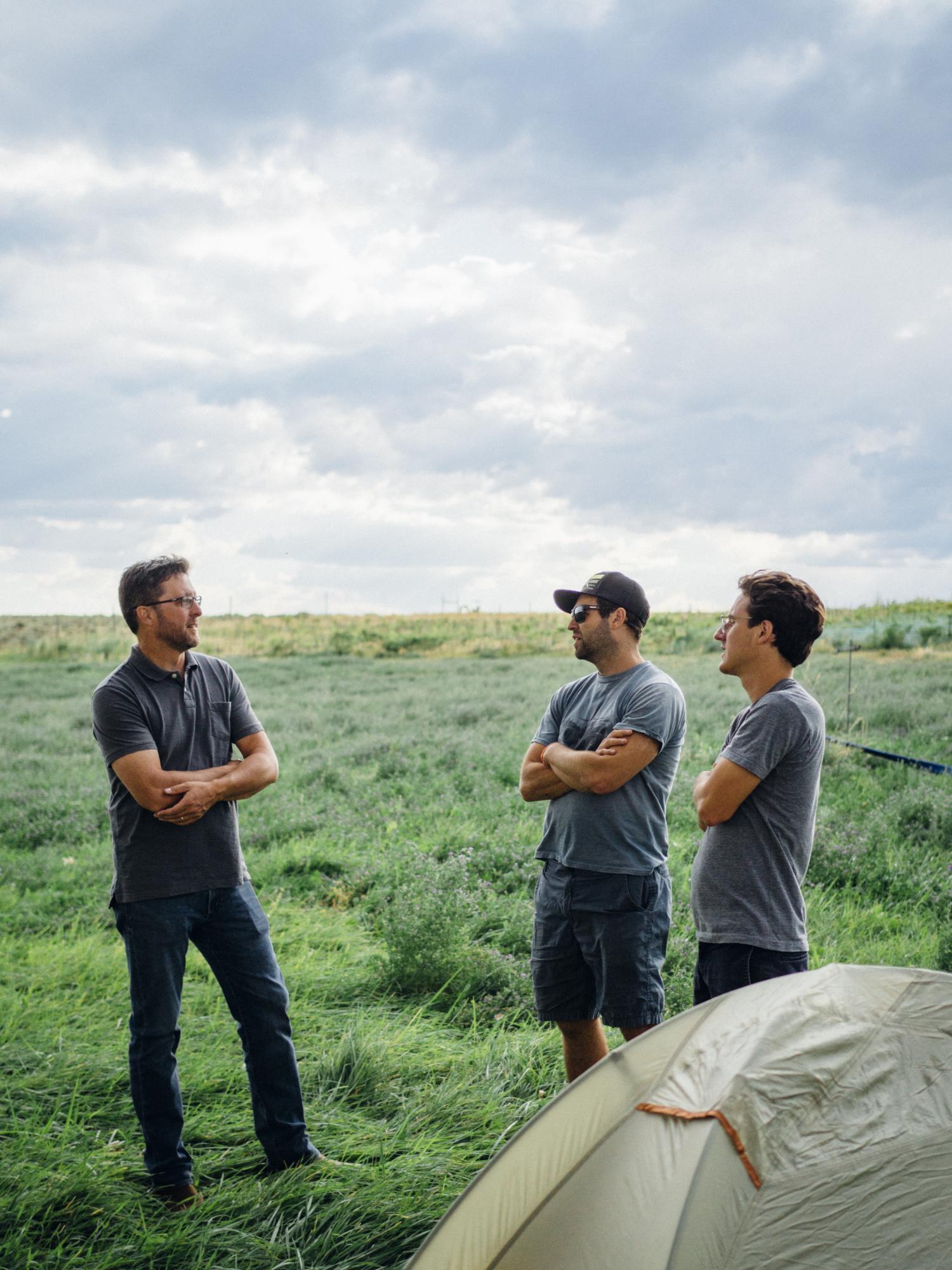Resilient Food Systems, Entrepreneurship, and Experiential Education

Introduction
Food system planning involves engaging stakeholders across the food economy and surrounding communities in forward-looking activities that support positive economic, social, and environmental outcomes. Work by the University of Colorado Boulder’s Masters of the Environment (MENV) program highlights the potential for clinical curriculum to engage in food system planning as a part of a broader rural economic development agenda. Findings of a recent Food System Assessment conducted in Delta County, Colorado, suggest that this approach can contribute to economic and social resilience in rural communities.
Background
The MENV program launched in 2016 with the express purpose of equipping students with the knowledge, skills, and experience necessary to address the complex environmental challenges of the 21st century. Students in the professional graduate program are prepared for careers as leaders through times of tremendous change by applying a potent combination of interdisciplinary academic inquiry, systems thinking, and creative practice to real-world issues. The program focuses on renewable and sustainable energy, sustainability planning and management, environmental policy, and sustainable food systems.
In the fall of 2019, MENV piloted its Clinic for Sustainable Solutions. Modeled on the experiential and community-oriented learning environments of law or design clinics, the Clinic for Sustainable Solutions invites students to take part in many of the professional activities they will encounter after graduation. They get to use their newly acquired knowledge and skills in collaboration with, and in service of, communities with critical unmet needs for sustainability consulting services. For its inaugural project, the Clinic partnered with ENGAGE Delta County, a rural economic development initiative helmed by Shawn Gardner and Barry Pennell. ENGAGE works in the food and energy sectors of Delta County to build capacity for entrepreneurs, increase regional economic cohesion, and connect businesses to supportive resources. Clinical faculty viewed the partnership with ENGAGE as an opportunity for students to appreciate the challenges associated with supporting decent rural livelihoods while promoting wise resource management. This partnership also enables the exploration of more mutualistic urban-rural economic exchanges – those that do not merely extract resources from natural resource-rich rural areas to urban centers, but that share value across the divide. Such exchanges are built on recognition of the fact that rural ingenuity and urban innovation are close cousins and that each needs the other to thrive.
In this first round of what is intended to be continuous engagement with the Delta region, the Clinic team produced a Food System Assessment to better contextualize and make more strategic efforts to promote innovation and entrepreneurship across agricultural production, processing, manufacturing, and consumer-facing food services. Ten students, supported by MENV faculty members Nicole Civita and Joel Hartter, engaged stakeholders, performed secondary data collection and analysis, and ultimately assembled a landscape view of the local food system and economy, inclusive of the encompassing socio-cultural and political context.
Findings
The MENV Clinic identified significant challenges facing the current food economy of Delta County. First, accessing markets in urban centers on the Front Range is a logistical and financial challenge for producers in this remote community, and markets closer to home do not necessarily offer the purchasing power or demand to support local brands. Second, growers feel that labor, in terms of both quality and quantity, presents a major hurdle for production. Complaints from stakeholders about the lack of qualified and motivated employees were common. These complaints were sometimes tempered by a recognition that the work can be demanding and the pay low. This lose-lose combination is even less appealing given the rising cost of living in the region and increasing opportunities in the booming job market of Front Range communities. Simply stated, market rates for farm labor and food manufacturing do not incentivize the majority of local workers or attract significant in-migration. A shifting political and regulatory environment also affects the availability of, and cost to, employ foreign visa workers, who growers have come to rely upon. And finally, macro trends in commodity prices and consumer preference have introduced uncertainty in the risk/reward profile of many activities. For instance, growth in the natural and organic food segments could drive more value for regionally-produced goods. However, some producers are wary of selling into this market for reasons ranging from the added regulatory burden of organic certification, the lack of dedicated organic processing infrastructure, the added complexity of marketing such products, and the perceived saturation of sales channels like regional farmers’ markets.
Recommendations
For all these challenges, food and agriculture continues to be a central pillar of the Delta region, as well as a source of considerable opportunity for entrepreneurs and established businesses. The Clinic team identified several strategies that ENGAGE could pursue in furtherance of a key goal for the regional food system: resilience. A resilient food system is characterized by the capacity for its entities to absorb shocks, respond to stressors with flexibility, and thrive in spite of disruptions and uncertainty. The Delta food system possesses some hallmarks of resilience (e.g., considerable diversity, intertwined social and political support, and moderate awareness of resource limitations), but could further develop its ability to mitigate disruptions and generate community-wide benefits.
Strategic activities to build resilient capacity include:
• Involvement of stakeholders across the socioeconomic spectrum;
• Consideration of the ways in which municipal systems (e.g., government, critical service providers, institutions, informal networks, plus many others) interact;
• Allocation of natural and financial resources with longevity in mind; and
• Encouragement of robust, mutually beneficial urban-rural economic exchanges.
Fortunately, initiatives like ENGAGE are actively scanning for such innovations and developing the social capital required to disseminate new ideas. The Clinic’s recommendations for ENGAGE included:
• Facilitating partnerships around proposed processing and manufacturing infrastructure;
• Deploying focused research on effective marketing and logistics;
• Brokering collaborative relationships between actors in the food economy with significant potential for synergy; and
• Developing program activities that help build an inclusive view of entrepreneurship across the community.
Effective resilience-building activities begin with deep knowledge of the local context and use available resources to target leverage points—places in a system where a small change in one thing can produce big, multifarious changes—for magnified impact. To intervene in this spirit, the Clinic recommended, as just one example, that ENGAGE aim some of its entrepreneur-supportive programming at the challenge of succession planning. Virtually none of the stakeholders involved in the Food System Assessment use off-the-shelf business models. Indeed, the food economy of the region seems characterized by degrees of innovation across enterprises that appear similar only on the surface. Unfortunately, many owners and operators of these distinctive businesses are nearing retirement without a plan for passing on leadership. When these founding visionaries retire, the region stands to lose economic activity, shared infrastructure, major employers, and the kinds of businesses that embody the character of the area.
Photo courtesy of Jane Cavagnero.
To build resilience in the Delta food system, ENGAGE could match apprentices from the local community college (or recruit from outside the region, if necessary) with business owners who lack a dedicated successor. Using resources at hand, this inter-generational intervention could address some of the food system’s main challenges at once. It could extend the lifespan of businesses that generate jobs and provide key intermediary services. It could provide employment that motivates young people to keep their talent in local communities. It could foster an informal network of peer apprentices and business leaders who are more likely to collaborate and share knowledge. Perhaps most importantly, it could empower a new generation of entrepreneurs to enact their own improvements across the food system without having to shoulder all the risk of starting from scratch.
Conclusion
ENGAGE Delta County and the Clinic for Sustainable Solutions enjoyed a collaborative and productive season of work. From the outset, the Clinic team saw that abundant creative energy and a purpose-driven work ethic permeate the Delta food system. There is also potent optimism that the work of ENGAGE and other entities can propel the food economy toward greater, sustained prosperity. Our initial assessment uncovered key actors and dynamics in the regional food system, but follow-up work is needed to enhance understanding. Thus, the Clinic plans to bring a fresh crop of MENV students—who will have studied their predecessors’ work with care and intention—to Delta County next fall to vet novel ideas and turn the most promising proposals into action.
Garrett Stoll is a recent graduate of the Masters of the Environment program at the University of Colorado Boulder and can be reached at Garrett.Stoll@Colorado.EDU.
Nicole Civita is an instructor and the Sustainable Food Systems Specialization lead in the Masters of the Environment Graduate Program at the University of Colorado Boulder and can be reached at Nicole.Civita@Colorado.EDU.
Photos courtesy of Jane Cavagnero.







